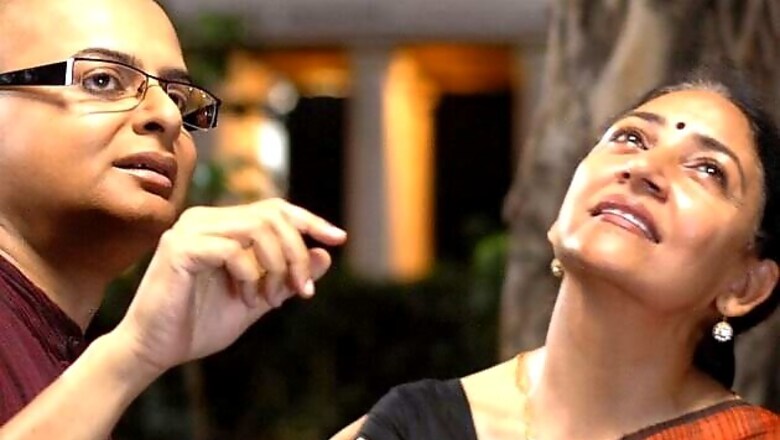
views
It hasn't been easy for Deepti Naval to find distributors for her debut directorial venture 'Do Paise Ki Dhoop, Chaar Aane Ki Baarish'. But the film, which was premiered in the market section of 2009 Cannes Film Festival and lauded for the subject it deal with, is expected to be released soon. In Leh to attend the screening of 'Do Paise Ki Dhoop, Chaar Aane Ki Baarish' at Ladakh International Film Festival, the actress-turned-filmmaker spoke exclusively to IBNLive about the film's subject, the dearth of quality cinema and recalled her experience when she shared the screen space with Rituparno Ghosh.
'Do Paise Ki Dhoop, Chaar Aane Ki Baarish' is about the complexity of relationships and how they are handled in the present times. Has it been a tough battle to find the right distributor who could understand and handle the sensitivity of the subject of your film?
Yes. It wasn't easy for me. That's why the film's release has been delayed. The subject of 'Do Paise Ki Dhoop, Chaar Aane Ki Baarish' is experimental and new for Hindi cinema. The film's story revolves around an aging prostitute, a gay film writer and a wheel-chair bound child. It is a story of bonding, about how they grow close to each other. For me, it is an unusual and an unlikely love story.
I'm sure 'Memories of March' also remains special because you worked with Rituparno Ghosh...
Yes, of course. The experience of sharing the screen space with Rituparno Ghosh in 'Memories of March' was lovely. I had always wanted to work with Rituparno the director, so that he could bring out the best in me. But it was a pleasant surprise when I got to know he would be my co-star in the film. It was a delight to work with Rituparno.
You make two brief appearances in your directorial venture. Any specific reason for not being a part of your film?
This film didn't require me at all. I think I made those appearances because I wanted cheap thrills 'Ki Haan Mai Bhi Hoon '. The second time I appear in the film, which is towards the end, is important because it has a connotation of change. When Manisha Koirala and I meet at a crossing path, it is to signify a change. For Juhi (Manisha), a prostitute, it has been a long journey to be form about her decision to not go back to her profession. She throws her sandal into the sea which again stresses on the sea change in her life.
Since the film revolves around a struggling lyricist, poetry remains core to the film. What do you have to say about the current appalling condition of Bollywood songs?
Lyrics should come back in a big way. Poetry should come back because it is so much a part of us. What we hear today are meaningless terms, words which don't make any sense, and what not. Poetry has taken a backseat. Abhi jab him purane gane yaad karte hain, we identify with the words, with what the songs say. Humara culture hi aisa hai ki humei sab chahiye apne aap ko express karne ko. I', waiting for the day when lyrics will be in the forefront.
The film also features your nephew Master Virej Desai. He looks a lot like you...
(Laughs) He stays in the US. He was happy that he didn't have to use his American accent in the film. He was quite good at what he did in the film.
You have amazing and natural performances in films like 'Chashme Baddoor', 'Katha', 'Angoor', 'Saath Saath', and many more. Do you feel there is a dearth of films in which scripts, performances and script are given more importance, films which we watched in the past?
I don't know about the rest of the country, but the dearth of such films is very disappointing. People think it is a good time for the industry with actors making big money and being part of big budget films. All that is fine, but as far as I'm concerned, I'm not happy with it. If I decide to perform character roles, I will stick to that and not kill it by doing only a couple of scenes in a few films. It isn't as if I haven't tried it before, but when I did, I was like 'What is this?' 'Is this for me?' 'It is not making sense!' That's why I have been waiting for something nice to come my way. People have often approached me and said, "Aap kyun nahi dikhti hai" So yes, I have understood the importance of staying visible. 'Ki dikhna zaroori hai'. But four scenes in 'Yaariyan' and one scene in 'BA Pass' and a couple of scenes in 'Zindagi Na Milegi Dobaara'. But at the end of it all, I wonder if that's good enough for me. That's when I feel like going back to my shell. But my major films 'Listen... Amaya', 'Freaky Chakra' and 'Memories in March' have happened in the last three years. My role in 'Firaq' was also very crucial, but I loved 'Memories In March'. These films have really been worth the while.
####




















Comments
0 comment